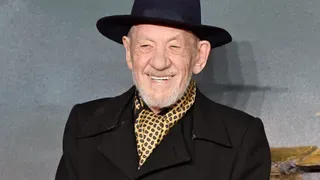
Feb 4
'Cabaret' Star Adam Lambert Stays in Character to Chide Audience for Laughing at Antisemitic Line
Kilian Melloy READ TIME: 4 MIN.
Adam Lambert didn't break character during an inauguration week performance of "Cabaret" where the audience found an antisemitic line to be uproariously funny. Instead, as the Emcee, he delivered a stunning clapback – and he got social media love for the moment, Newsweek reports.
The line in question caps a song called "If You Could See Her," in which Lambert's character sings to a gorilla. The Kander and Ebb song delivers a twist with the words, "If you could see her through my eyes she wouldn't look Jewish at all."
Lambert plays the role of the Emcee of the Kit Kat Club, a queer bar in Weimar Germany just as the Nazis are rising to power. The openly gay Queen frontman and former "American Idol" star has adopted an approach to the role that underscores parallels to 1930s Germany with the American political climate of today.
When the audience's guffaws at the song's surprise ending grew and grew, Lambert decided enough was enough. Without breaking character, he turned and snapped, "No. This is not comedy. Pay attention."
The moment brought at least one person in the audience to tears.
The jovial response from the crowd, posted the audience member in "an open letter to Adam Lambert," wasn't "nervous laughter, not shocked laughter, but people who found the surprise that it was a Jewish gorilla legitimately funny."
"As I was shaking my head that we live in a world that didn't get the point of that joke," the person posting added, Lambert briefly stopped the show with the epic line.
"Especially the week of this inauguration, I really appreciated that," the person posting the open letter added.
One comment to the post pointed out that "According to the Broadway reddit this isn't the first time Adam has had to do that :(," while another contrasted the response of today's audiences with those of years past: "When I saw my college do this show, once they got to this line the audience was silent jaws on the floor.
"I couldn't imagine anyone laughing at that let alone because they thought it was funny," the comment added.
"I was in the mexican production of Cabaret this past year and sadly this kind of laughter occurred too," another commenter contributed. "As a jewish actor in the preshow it was very hard to witness it".
Lambert himself took to the comments section of his own post to tell his followers, "Thank you so much for your kind words. I really consider it a privilege to be working with such a gifted cast and creative team on a show that has so much to say about what is happening RIGHT NOW.
"It's been relevant since it premiered in the late 60's," Lambert added of the show, "and I HOPE audiences walk away THINKING and feeling empathy towards how marginalized groups can be scapegoated as political strategy.
"That's my hope and motivation every show," Lambert added, "to pull you into an irresistible community and then make you miss us as we are stolen from you. Maybe just maybe we can change some minds."
In a further demonstration of his conviction that the show speaks directly to today, Lambert recorded a studio version of another of the show's songs, "I Don't Care Much," about the Emcee's response to the growing horrors of the Nazi ascendancy. Lambert released the track as a single with an accompanying video.
"This is probably my favorite song to sing in the show," the out singer said in comments to People.
"There's a timelessness to this song," Lambert went on to say. "It's so beautiful and has this great melody. And out of all the songs I sing in the show, it's one where I really get to show off what I can do vocally and emotionally."
He does it a little differently than on stage, though; as he noted to People, "I recorded it without my German accent," which is part of the role of the Emcee, "for the purposes of a crossover appeal."
The iconic musical dates to 1966, but is based on a play from 1951 that, in turn, is based on the 1939 Christopher Isherwood novel "Goodbye to Berlin."
In the novel, Isherwood draws on his own experiences in Berlin at the very end of the Weimar Republic. Isherwood, a writer born in Britain, was part of the queer demimonde that flourished prior to the Nazis coming to power in Germany. As the nation slipped into Nazism, Isherwood fled the country, but many others were unable to escape persecution.
The Nazis launched a reign of terror that engulfed much of Europe in a holocaust of war, violence, and mass murder. The Nazis' systematic eradication of Jews, gay men, gypsies, racial minorities, ideological "enemies," and other targets that claimed the lives of an estimated 17 million people, six million of them Jewish.
Lambert explained the song, telling People that "He's saying, 'Well, I don't really care; it doesn't matter to me,' which is what the song is about."
However, "The audience sees through the performance," Lambert added. "They know that underneath it, he is affected and very sad. But he's going to survive by shrugging his shoulders, which so many people do."
Watch the video for Lambert's single version of "I Don't Care Much" below.
Kilian Melloy serves as EDGE Media Network's Associate Arts Editor and Staff Contributor. His professional memberships include the National Lesbian & Gay Journalists Association, the Boston Online Film Critics Association, The Gay and Lesbian Entertainment Critics Association, and the Boston Theater Critics Association's Elliot Norton Awards Committee.







